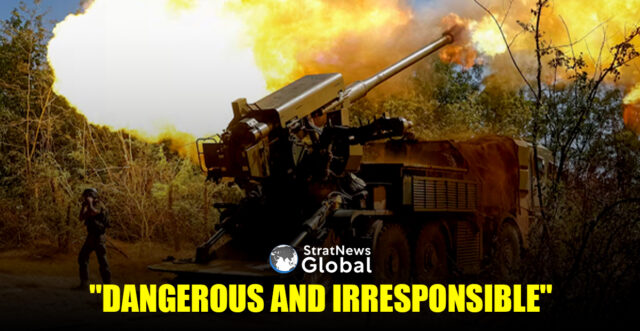Discussions among allies about deploying European peacekeeping forces to safeguard Ukraine under a potential peace deal with Russia have triggered backlash in Germany, a nation still sensitive to its militaristic Nazi history, despite the plan remaining unlikely.
Chancellor Friedrich Merz has signalled openness to German participation in a possible peacekeeping mission in Ukraine while emphasising that such a decision would require coordination with European partners and his own coalition.
He also noted that any troop deployment would likely require a Bundestag mandate, a challenge for a chancellor whose own appointment was only voted through on the second attempt. Russia is fiercely opposed to any troops from the NATO alliance being deployed, and it is far from clear how such a force could work.
‘Dangerous And Irresponsible’
Alice Weidel, the head of the surging far-right Alternative for Germany (AfD), accused Merz’s conservatives of war-mongering for even considering the idea of ground troops, slamming it as “dangerous and irresponsible”.
Even Merz’s Foreign Minister, Johann Wadephul, warned that sending troops to Ukraine “would probably overwhelm us”.
There is unease in Germany over troop deployments, given its Nazi past and more recent deployments to Afghanistan and Mali that were widely seen as failures. There is also a backlash against spending billions of euros on military aid for Ukraine when Germany’s own economy is struggling.
Policymakers, meanwhile, are nervous about overstretching Germany’s long-neglected army and being sucked into a direct confrontation with a nuclear power.
“Something like this is obviously extremely controversial in Germany,” said Marcel Dirsus, Non-Resident Fellow at the Institute for Security Policy at Kiel University, adding that the government would tread very carefully.
“There is no point expending political capital on something that might not actually come to pass,” he said.
It is tricky waters to navigate for Merz, who, after winning elections this year, has pledged to make Germany’s conventional armed forces the most powerful in Europe, backed by hundreds of billions of euros in new borrowing.
Jens Spahn, the parliamentary leader of Merz’s Christian Democratic Union party (CDU), wrote to lawmakers urging them to refrain from publicly speculating about the issue, according to a letter leaked to German media.
Merz’s popularity has sagged since winning office, and the AfD, which has taken Russia-friendly positions and opposes weapons aid to Ukraine, is leading national opinion polls ahead of local elections next year. The AfD posted a mocked-up image on X of Merz grinning above five young Germans with the words: “Merz wants to send YOU to Ukraine? We don’t!”
Divided Germany
French President Emmanuel Macron and British Prime Minister Keir Starmer have both spoken in favour of troop deployments in a post-war settlement, but Germans are more wary of the idea.
According to a Forsa survey commissioned by RTL/ntv, 49% of Germans would support Germany sending its own soldiers to a European peacekeeping force, but 45% oppose it – compared to much stronger majorities in favour in Britain and France.
Scepticism is particularly strong in East Germany, where three states hold elections next year.
Sven Schulze, state leader of Merz’s CDU in one of those states, Saxony-Anhalt, told Stern magazine the Bundeswehr was barely in a position to deploy troops.
It was much more important to build “a strong European security architecture,” he said. “Anything else would overwhelm us as a country and also the Bundeswehr.”
Scepticism is even greater within Merz’s junior coalition partner, the Social Democrats, who have traditionally argued more in favour of engagement with Russia.
“Germany should stay out of this matter,” Ralf Stegner, a lawmaker from the leftist, more pacifist faction of the SPD, told Der Spiegel. “The deployment of German soldiers in the region is also extremely difficult for historical reasons.
For some, including Thomas Roewekamp, the CDU head of the parliamentary defence committee, German troops would be needed in the event of a permanent ceasefire between Russia and Ukraine.
“And to make deterrence credible, we must have military capabilities,” he told broadcaster WDR 5’s Morgenecho.
Asked about the deployment, Merz on Monday said “it is too early today to give a definitive answer”.
(With inputs from Reuters)





